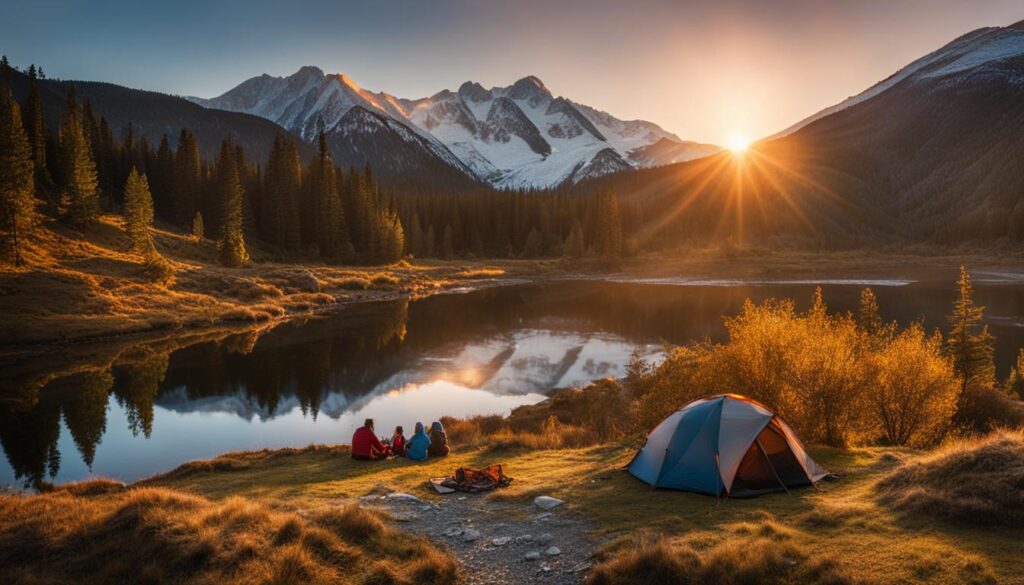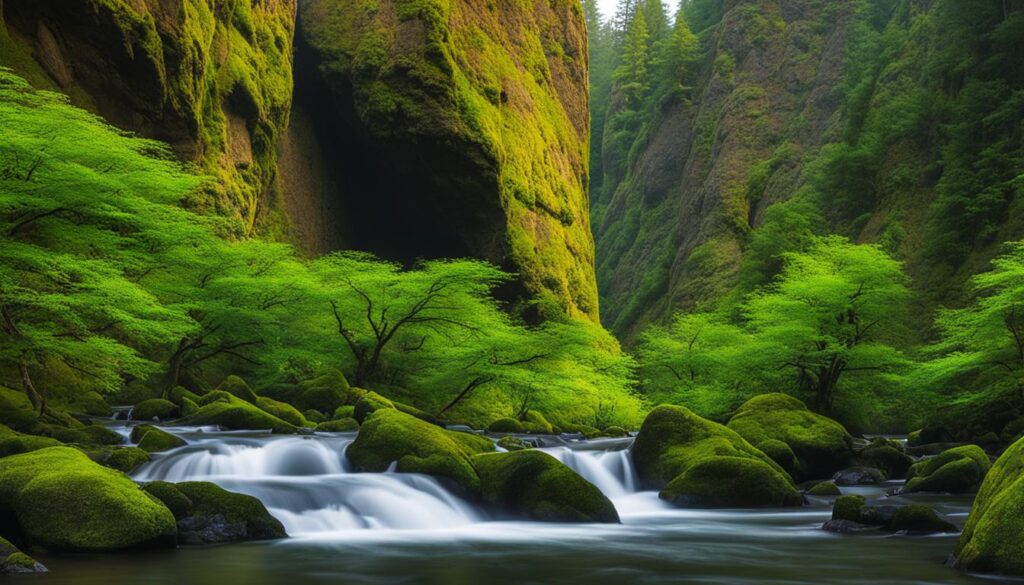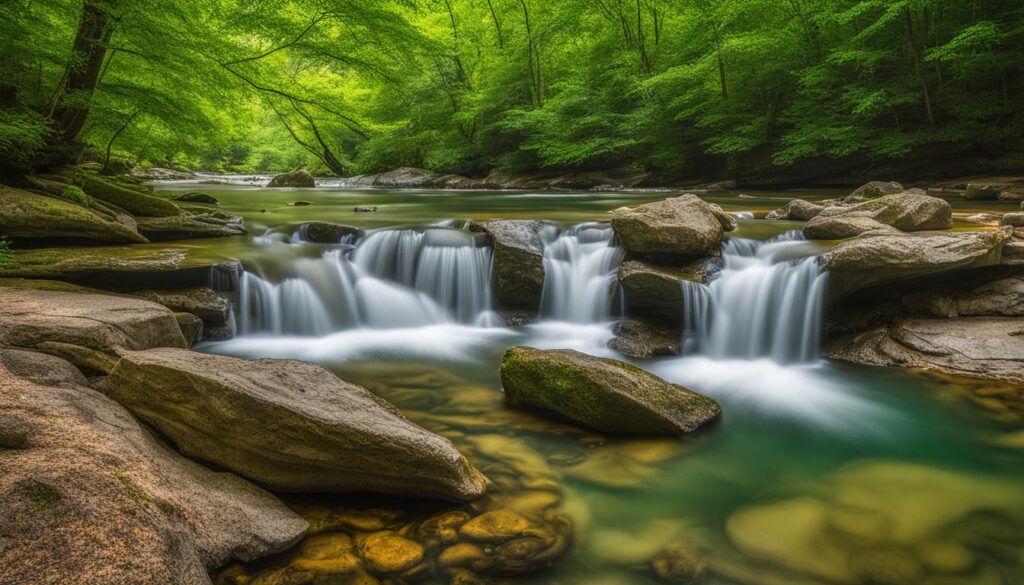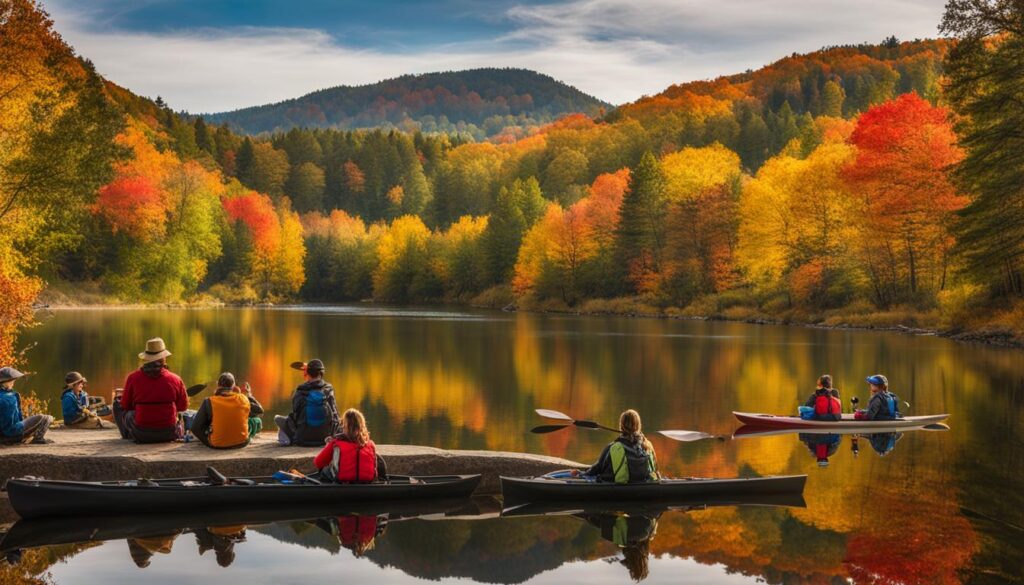Are you ready for an adventure like no other? Backcountry camping offers the opportunity to immerse yourself in the wilderness, away from designated campsites and modern amenities. It’s an exhilarating form of camping that requires careful planning, preparation, and a sense of adventure. Whether you’re a beginner or an experienced outdoor enthusiast, backcountry camping allows you to connect with nature and experience the great outdoors in a unique way.
So, what exactly is backcountry camping? It’s a type of camping where you venture into remote and undeveloped areas, carrying all your gear and supplies on your back. As you hike or trek to your chosen camping spot, you’ll be surrounded by breathtaking landscapes, unspoiled nature, and the peace and quiet of the wilderness. Backcountry camping offers a sense of freedom and self-reliance, as you rely on your own skills and resources to survive and thrive.
Key Takeaways:
- Backcountry camping is an adventurous form of camping that involves venturing into remote and undeveloped areas.
- Campers carry all necessary gear and supplies on their backs and hike or trek to their chosen camping spot.
- Backcountry camping requires careful planning, preparation, and a good understanding of wilderness skills and safety measures.
- It provides an opportunity to escape the hustle and bustle of everyday life and reconnect with nature.
- Backcountry camping offers a deeper connection with the natural environment and a greater appreciation for fragile ecosystems.
Contents
The Benefits of Backcountry Camping
Backcountry camping offers numerous benefits that attract outdoor enthusiasts. Firstly, it provides an opportunity to escape the hustle and bustle of the modern world and reconnect with nature. The solitude and tranquility of the wilderness can be a refreshing break from the noise and distractions of everyday life.

Additionally, backcountry camping allows campers to explore remote and breathtakingly beautiful locations that are not accessible by cars or crowded with other campers. It also provides a sense of self-reliance and independence, as campers have to rely on their own skills and resources to survive in the wilderness.
“The solitude and tranquility of the wilderness can be a refreshing break from the noise and distractions of everyday life.”
Finally, backcountry camping allows for a deeper connection with the natural environment and a greater appreciation for the fragile ecosystems that exist in these pristine areas.
Advantages of Backcountry Camping
- Escape from the modern world and reconnect with nature
- Explore remote and beautiful locations
- Develop self-reliance and independence
- Connect with the natural environment and appreciate ecosystems
With these advantages in mind, it’s no wonder that more and more people are choosing backcountry camping as a way to experience the great outdoors.
Essential Gear for Backcountry Camping
Proper gear is essential for a successful and enjoyable backcountry camping experience. While the exact gear you need will depend on factors such as the climate, terrain, and personal preferences, there are some basic items that every backcountry camper should have.
Here are the must-have gear for backcountry camping:
- Backpack: A sturdy backpack with ample storage space is crucial for carrying all your gear and supplies.
- Sleeping bag: Choose a sleeping bag that is suitable for the temperature range you expect to encounter during your trip.
- Sleeping pad: A sleeping pad provides insulation and cushioning for a comfortable night’s sleep.
- Tent or shelter: A reliable tent or shelter protects you from the elements and provides a safe place to sleep.
- Cooking equipment: Pack lightweight cooking utensils, a stove, and fuel canisters to prepare meals in the backcountry.
- Water purification method: Ensure access to clean drinking water by carrying a water filter, purification tablets, or a portable water purifier.
- Navigation tools: Carry a map, compass, or GPS device to navigate unfamiliar terrain and stay on track.
- First aid kit: Pack a comprehensive first aid kit to address any potential injuries or medical issues.
- Appropriate clothing and footwear: Dress in layers and choose moisture-wicking, quick-drying materials. Wear sturdy, comfortable hiking boots or shoes.
- Personal hygiene items: Include essentials such as toilet paper, hand sanitizer, and biodegradable soap.
It is important to choose lightweight and durable gear that is suitable for the specific conditions of your trip. Prioritize gear that is compact and space-saving, as you will have to carry everything on your back.

Tips for Backcountry Camping
Planning and preparation are key to a successful backcountry camping trip. Whether you’re a seasoned outdoor enthusiast or a beginner, these tips will help you make the most of your adventure:
1. Research and choose the right gear
Invest in high-quality gear that suits your trip’s specific needs and the prevailing weather conditions. Make sure to pack essential items such as a backpack, sleeping bag, tent, cookware, and appropriate clothing. Prioritize lightweight and compact gear to minimize the weight you carry.
2. Plan your route and check the weather
Plot your route in advance and study a map of the area. Consider factors like trail difficulty, potential water sources, and campsites. Check weather forecasts before you embark on your trip and be prepared for any changes in conditions.
3. Practice Leave No Trace principles
Respect the environment and leave it as you found it. Always follow Leave No Trace principles, which include packing out all trash, staying on established trails, and minimizing campfire impact. By doing so, you contribute to the preservation of nature for future generations.
4. Stay hydrated and pack enough food
Ensure you have an adequate supply of water for your entire trip, as water sources may be scarce or contaminated. Pack lightweight, nutritious, and non-perishable food items that will sustain you throughout your journey.
5. Be prepared for emergencies
Carry a well-stocked first aid kit and familiarize yourself with its contents. Additionally, learn basic first aid and wilderness survival skills. Tell someone about your trip plans and estimated return time, so they can raise the alarm if you don’t check in.
6. Practice setting up camp before your trip
Familiarize yourself with pitching your tent and using your gear before embarking on your backcountry camping adventure. This will save you time and potential frustration once you’re out in the wilderness.
“Backcountry camping offers a unique opportunity to disconnect from the modern world and immerse yourself in nature’s beauty. Proper planning and preparation will ensure a safe and unforgettable experience” – John Smith, Outdoor Enthusiast
Remember, backcountry camping requires self-sufficiency and wilderness skills. By following these tips, you’ll be well-equipped for a rewarding and successful backcountry camping trip.
| Tips for Backcountry Camping | Description |
|---|---|
| Research and choose the right gear | Invest in high-quality gear that suits your trip’s specific needs and the prevailing weather conditions. |
| Plan your route and check the weather | Plot your route in advance and study a map of the area. Consider factors like trail difficulty, potential water sources, and campsites. |
| Practice Leave No Trace principles | Respect the environment and leave it as you found it. Follow principles such as packing out all trash and minimizing campfire impact. |
| Stay hydrated and pack enough food | Ensure you have an adequate supply of water and pack lightweight, nutritious, and non-perishable food items. |
| Be prepared for emergencies | Carry a well-stocked first aid kit, learn basic first aid and wilderness survival skills, and inform someone about your trip plans. |
| Practice setting up camp before your trip | Familiarize yourself with pitching your tent and using your gear before embarking on your backcountry camping adventure. |

Choosing the Right Backcountry Camping Location
The choice of backcountry camping location can greatly impact your experience. There are numerous stunning backcountry camping spots around the world, each offering unique landscapes and challenges.
Some popular destinations for backcountry camping include national parks, wilderness areas, and remote mountain ranges. Some well-known locations in the United States include Yosemite National Park, Glacier National Park, the Appalachian Trail, and the Grand Canyon.
When choosing a location, consider factors such as the terrain, climate, wildlife, regulations, and accessibility. Research and gather information about the area to ensure it aligns with your preferences and skill level.

Comparison of Popular Backcountry Camping Locations
| Location | Terrain | Climate | Wildlife | Regulations | Accessibility |
|---|---|---|---|---|---|
| Yosemite National Park | Mountainous, granite cliffs, waterfalls | Mild summers, snowy winters | Black bears, mule deer, coyotes | Permits required | Varied trail difficulty |
| Glacier National Park | Glaciated peaks, alpine meadows | Cool summers, cold winters | Grizzly bears, mountain goats, moose | Permits required | Varied trail difficulty |
| Appalachian Trail | Mountainous, forested | Varies by section | Black bears, white-tailed deer, rattlesnakes | Primitive camping guidelines | Trail accessible at various points |
| Grand Canyon | Canyons, cliffs, Colorado River | Hot summers, cool winters | California condors, bighorn sheep, rattlesnakes | Backcountry permits required | Steep trails, challenging rim-to-rim hikes |
Safety Considerations for Backcountry Camping
When embarking on a backcountry camping adventure, safety should be your top priority. The wilderness can be unpredictable, and proper precautions are essential to ensure a safe and enjoyable trip. Here are some key safety considerations to keep in mind:
1. Plan and Prepare: Thoroughly research your chosen backcountry camping location and check for any potential hazards or restrictions. Create a detailed trip itinerary, including your route, estimated time of arrival, and emergency contact information. Familiarize yourself with basic wilderness first aid and navigation skills.
2. Pack and Use Safety Equipment: Carry essential safety gear, including a first aid kit, headlamp, whistle, and fire starter. Make sure your gear is in good condition and familiarize yourself with how to use it. Always wear appropriate clothing and footwear for the terrain and weather conditions.
3. Be Aware of Wildlife: Research the local wildlife and understand how to safely coexist with them. Properly store your food to prevent attracting animals to your campsite. If you encounter wildlife, maintain a safe distance and avoid approaching or feeding them. Be knowledgeable about bear safety and carry bear spray if necessary.
4. Practice Leave No Trace Principles: Respect the environment and leave it as you found it. Pack out all trash and dispose of human waste properly. Minimize your impact on the ecosystem by staying on designated trails and campsites.
By following these backcountry camping safety tips and taking necessary precautions, you can enjoy a memorable and safe outdoor experience. Remember, preparation and vigilance are key to a successful backcountry adventure.
FAQ
What is backcountry camping?
Backcountry camping is an adventurous form of camping that involves venturing into remote and undeveloped areas, away from designated campsites and amenities.
What are the benefits of backcountry camping?
Backcountry camping offers an opportunity to escape the modern world, explore remote and beautiful locations, experience solitude and self-reliance, and develop a deeper connection with nature.
What gear do I need for backcountry camping?
Essential gear for backcountry camping includes a backpack, sleeping bag, tent or shelter, cooking equipment, water purification method, navigation tools, first aid kit, appropriate clothing and footwear, and personal hygiene items.
Do you have any tips for backcountry camping?
Tips for backcountry camping include careful planning and preparation, learning wilderness skills, packing lightweight and durable gear, practicing leave-no-trace principles, and being aware of weather conditions and wildlife.
How do I choose the right backcountry camping location?
When choosing a backcountry camping location, consider factors such as terrain, climate, wildlife, regulations, accessibility, and your skill level.
What safety considerations should I keep in mind for backcountry camping?
Safety considerations for backcountry camping include informing others of your plans, staying aware of your surroundings, carrying necessary safety equipment, being prepared for emergencies, and respecting the wilderness.






